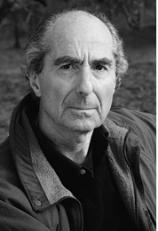Exit Ghost
Review
Exit Ghost
After living as a hermit in a forest cabin for 11 years, Nathan
Zuckerman, now 71, must head to New York for surgery. A shadow of
his hungrily virile, robust self, he is now unable to control his
urine flow. Driven to restore some of his once-mighty
phallus’s dignity, he seeks out prostate surgery. He is worn
and tired; these early descriptions of his life in the cabin and
the surgery are at once suavely comic and tenderly sad, while still
preserving the nobility of his solitude.
Zuckerman sees in a classified ad that a couple is looking to swap
their yuppie apartment for a cabin in the woods for one year.
Rashly deciding to make the switch, he meets them and becomes
boyishly infatuated with the 30-year-old wife, Jamie. Later in New
York, he also meets Richard Kliman, a college boyfriend of
Jamie’s who is doggedly collecting research for a book about
E.I. Lonoff. Kliman etches out a secret to Zuckerman, who believes
it would shatter Lonoff in the eyes of the “literary”
public, a group he believes now considers muckraking tabloid news
of writers to be worthy of serious cultural attention.
Zuckerman’s manifestation of his infatuation is done largely
through fantasy. He craves moments just to be in the same room as
her, even in the presence of her husband. He writes a dialogue
between “he” and “she” to play out all the
conversations he wishes he could have with her. Knowing the absurd
fantasy he is letting himself into, considering it alongside the
rash choice to move to New York, Zuckerman says of the dialogues:
“If ever there was something that didn’t need doing,
it’s this. Now you are taken up with her totally.”
Zuckerman is never reduced to pathetic old man status, never too
clingy or needy; instead, he is constantly confronted by the
invigorating and destructive desires that he thought he had lost.
In his own words, he is a “taunted old man dying to be whole
again.” The plain and direct prose is rich with subdued
emotional ennui.
His battle against Kliman goes similarly. Zuckerman considers him a
dog interested only in destroying a great man’s success to
start his own career. The similarities drawn between Zuckerman and
Lonoff make clear the personal implications for him. He considers
this a moral battle of sorts, one that riles him up as much as his
feelings for Jamie.
Through both of these dramas, Zuckerman resembles a
force-tranquilized, caged animal rebelling against his keepers.
Everything must be done with consideration: conversations must be
logged to be remembered, Kliman’s tormenting youth constantly
must be abated and Jamie’s addictive presence is as much a
source of frustration as of life. Death and life taunt the
anachronistic man. After 11 years of singular isolation, he has
returned to a world not his own --- this is not his New York, these
are not his intellectuals (their intense despairing about
Bush’s re-election is hilariously overwrought to us and alien
to him).
Philip Roth sympathetically sculpts Zuckerman’s looming sense
of fear of the world trying to pick him apart and his commitment to
remaining in it, despite the ease with which he could return to his
cabin. And yet Roth does this without maudlin heavy-handedness:
EXIT GHOST has no pretensions --- its honesty is one of its
greatest strengths. Zuckerman’s conflicted inner world is a
profound portrait of a dying man.
Roth gives no easy answers to what it feels like to have the stuff
of one’s self melt away. But we see the experience easily
enough through Zuckerman. Death, it appears, provokes global
reactions: one does not merely confront it in one’s mind ---
it feels as if the whole world is pressing down, slicing away
liberties and confining everything to a small cage. In
Zuckerman’s journey we see few “universal life
lessons” or other such cheap tricks; Roth does not stoop to
that banal level. Instead, we are given insight into a man who
shows us why an injured, still-proud predator refuses to close its
eyes and die.
Reviewed by Max Falkowitz on January 21, 2011
Exit Ghost
- Publication Date: October 1, 2007
- Genres: Fiction
- Hardcover: 304 pages
- Publisher: Houghton Mifflin Harcourt
- ISBN-10: 0618915478
- ISBN-13: 9780618915477





